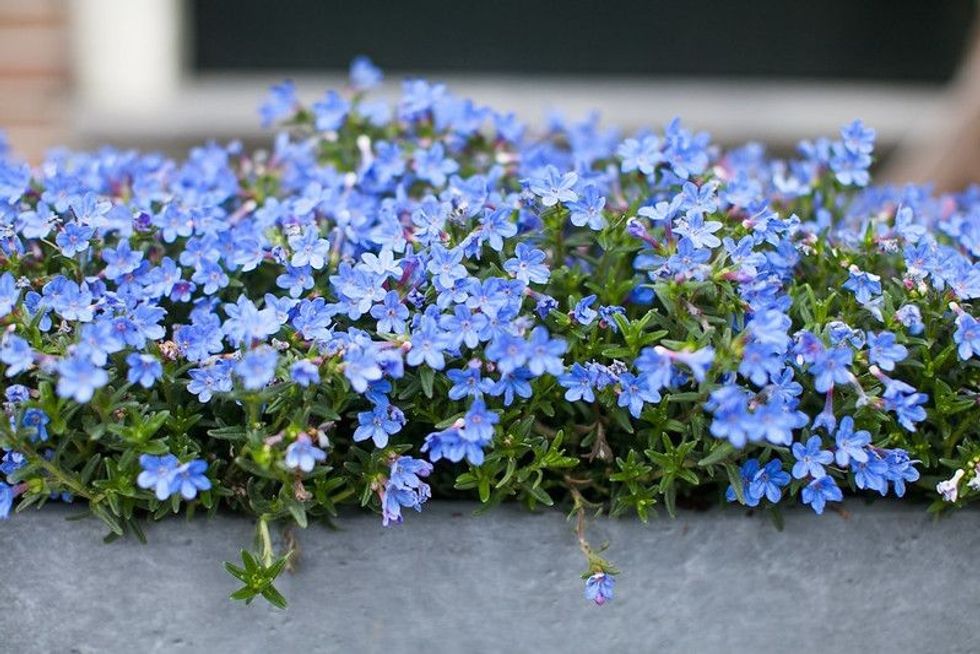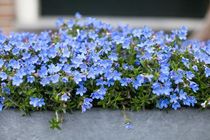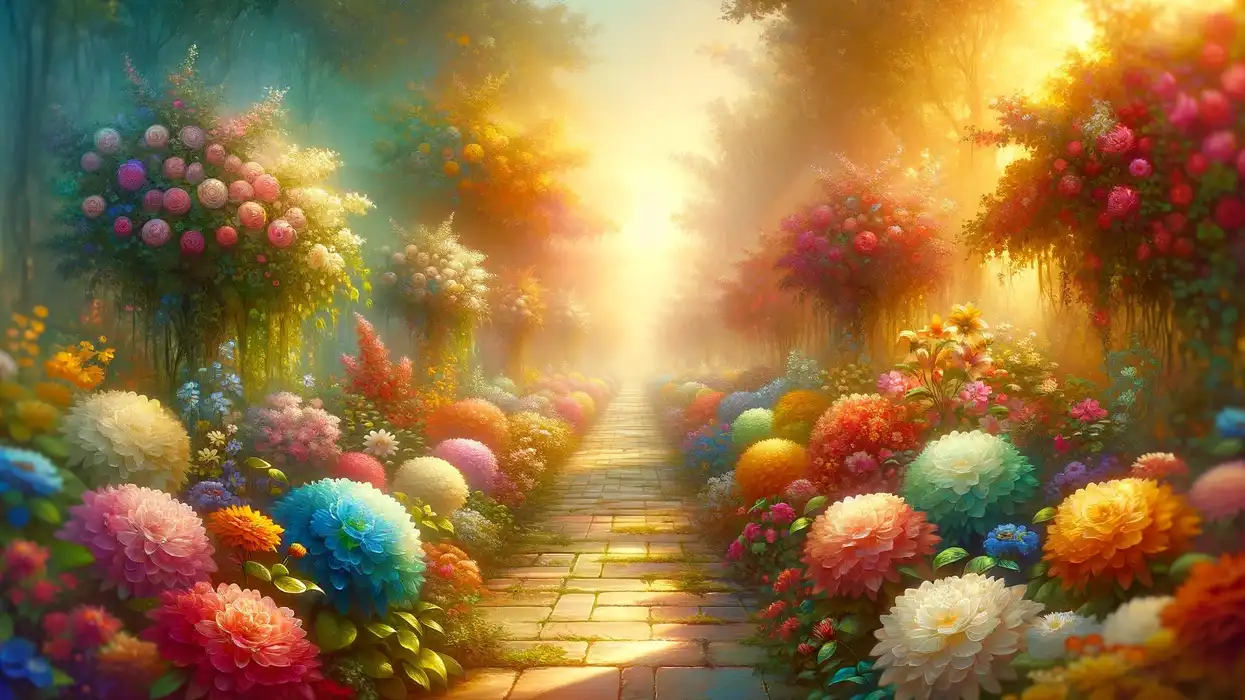40+ Blue Flowers Names For Garden Inspiration

What does the color blue mean to you? How do you associate with the blue color? Some associate the blue color with warmth, sky, water or ocean, or even endless possibilities.
Blue is a fantastic color, which can be associated with one's longings, expectations, sentiments, and feelings. It is accepted that blue is the regal and royal color, which also speaks of power, force, and class.
So, if you are big on gardening and looking for inspiration for blue flowers for your garden, then keep on reading. We have compiled a list of blue flowers, which are soothing and peaceful and consequently, gives our state of mind a peaceful environment.
Different researchers relate blue color to peace, profundity, and profitability. However, the light blue flowers and dark blue flowers are often associated with negative feelings like loneliness and sadness. There are so many reasons why you should plant at least one blue flower in your garden.
You can also see our articles on pink flower names and flower names for boys right here on Kidadl.
Popular Blue Flowers
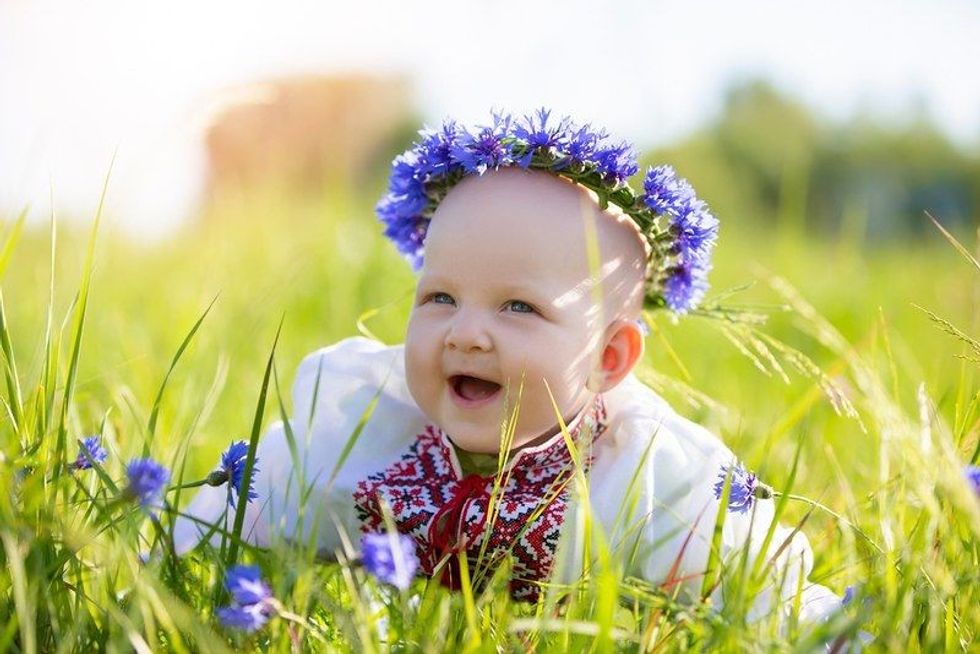
Some of the naturally blue flower names are Blue Himalayan Poppies, Grape Hyacinths, Annual Cornflowers, and Morning Glories. These blue colored flowers can add a cool touch to the landscape and your beautiful garden.
1. Bellflower: One of the most common and popular flowers to adorn any garden is the Bellflower.
As the name would imply, this blooms is shaped like a bell and comes in various shades of blue. These bell-shaped flowers have a tall stem and because of its tallness, bellflower, otherwise called campanula, is likewise favored for cut bloom and interior vase decoration. It represents gratitude and humility.
2. Blue Star: This star-molded blooms got its name from the shape of its petals.
This flower is little when growing can take the shape of a pretty rich blossoming rug in just two or three weeks, this blossom can be a show-stopper in your nursery heaven. It represents endurance, strength, and determination. These flowers need full sun and well drained soil.
3. Brunnera: This is a five-petal blossom with splashes over the foliage and blooms in late-winter which is the reason it is frequently seen as the prompt riser of the blossoming season. It represents love and heart. These flowers grow well in partial shade.
4. Clematis: If you are looking for a climbing plant, which can also work as a divider or a decoration of the wall in partial shade, then the Clematis flower is just what you should be looking for.
This flowering plant comes in various tones, yet the blue rendition is related with boldness and steadfastness. It signifies the beauty of ingenuity or the trait of artifice.
5. Cornflower: If you are looking for magnificent flowers, which can attract butterflies and honey bees to your garden, then you should try planting cornflowers, which grows throughout the year. The flower was earlier known as the 'Bachelor’s button flower'. The flower is the national flower of Poland. It signifies a positive reputation. These flowers need well drained soil.
6. Delphinium: Delphinium blossoms are normally an image of a solid connection. These flowers does not grow in extreme hot weather and requires a cool yet summerish condition to grow, they need partial shade and well drained soil. These condition should not be too dry or watery. It signifies cheerfulness and goodwill.
7. Desert Bluebells: As the name recommends, these blue blooms are bell-shaped, otherwise called phacelia campanular, appreciate sandy and dry zones, and are impervious to dry season which is the reason it is viewed as simple to develop, they do well in full sun. It signifies humility or sometimes gratitude.
8. Empire Blue Butterfly Bush: This blossom, otherwise called Buddleia, is fragrant and this is one of the principal reasons why it draws in numerous butterflies and hummingbirds, making it a genuine fortune for your nursery.
It has spear formed leaves with blossoming branches shrouded in the partial shade of blue. It signifies sweetness, beauty, and grace. These flowers need partial shade and well drained soil.
9. Forget Me Not: This late 15th-century bloom got its name from the expresses "do not forget". This flower was given as a token by loved ones to the wearer, symbolizing that they will not be forgotten.
This light blue and yellow blossom begins to flower in mid-year and can be a wonderful addition to your garden. It signifies true love. This flower grows well in any condition from partial shade to full sun.
10. Gentian: Being the image of gentility, this eccentric bloom can generally be found in Europe. Its unmistakable shape and shading make it suitable for capricious nursery plans and special scenes. It signifies cheerfulness and goodwill.
11. Glory-Of-The-Snow: As the name proposes, these true blue blooms frequently begin growing even before the snow softens which makes them a portion of the primary shorts demonstrating the soon-to-come spring. The flowers are grown in well-moist soil. It signifies serenity and stillness.
12. Grape Hyacinth: This bloom, often as hyacinths, blooms in mid-spring and is known to mark the blossoming seasons of flowers. Various floral societies use the grape hyacinth as their logo as the flower symbolizes trust and affection.
13. Hyacinth: Hyacinths are perfect spring blossoms with a distinctive and sweet aroma and lovely shaped flowers, which has been respected by illustrious families all through the ages and in this manner, have gotten an absolute necessity for castle nurseries and manor parks. It symbolizes a sport or play.
14. Hydrangea: This bloom is one of the most amazing nursery plants you can have.
It comes in many colors and a partial shade of blue. Hydrangea blooming shrubbery begins sprouting toward the start of the spring and this can proceed for the entire summer season whenever dealt with appropriately, ideally they need full sun and well drained soil. It is associated with heartfelt emotion, gratitude for understanding.
15. Iris: The Iris is a dazzling blossom that comes in various shadings and can bring a new summer soul to your nursery. This blossom is named after the Greek goddess of the rainbow. It can grow throughout year and it signifies wisdom, hope, trust, and valor.
16. Perennial Geranium: This blossom grows throughout the year. You can make the most of its dark blue tone from June to the weighty winter time frame as it is well impervious to a chilly climate and lower temperatures. These flowers are hardy and perfect for shady gardens.
17. Periwinkle: This short shrub frames pretty and fragrant true blue blossoms that have the shade of the sky and the ocean. It is regularly utilized as a ground cover because of its moderately low tallness and immediately spread and is an awesome choice to be utilized as an establishment cover for taller plants.
18. Passionflower: This plant is one of the most stunning blossoms you can have for ornamental decorating in your nursery.
You can regularly observe it covering walls and fences and intensely blossoming the entire summer and early fall. It arrives in an assortment of tones yet the blue is supposed to be one of the most superb. This flower needs well drained soil and ideally access to full sun.
19. Salvia: Or as known as the Wild Sage, this bloom comes in a unique blue shading, which makes it the prettiest flower among all. It need a well-drained soil, full sun, and early spring season to grow. As it belongs to the mint family, you can also it to brew tea to treat common cold,
20. Stiff Blue-Eyed Grass: Do not confuse this plant with grass just because its name said so. This is one of the most popular blue flowers that are adorned by many flower lovers and gardens. It is generally easy to grow and it acclimates to well drained soil and full sun.
Unique Blue Flowers
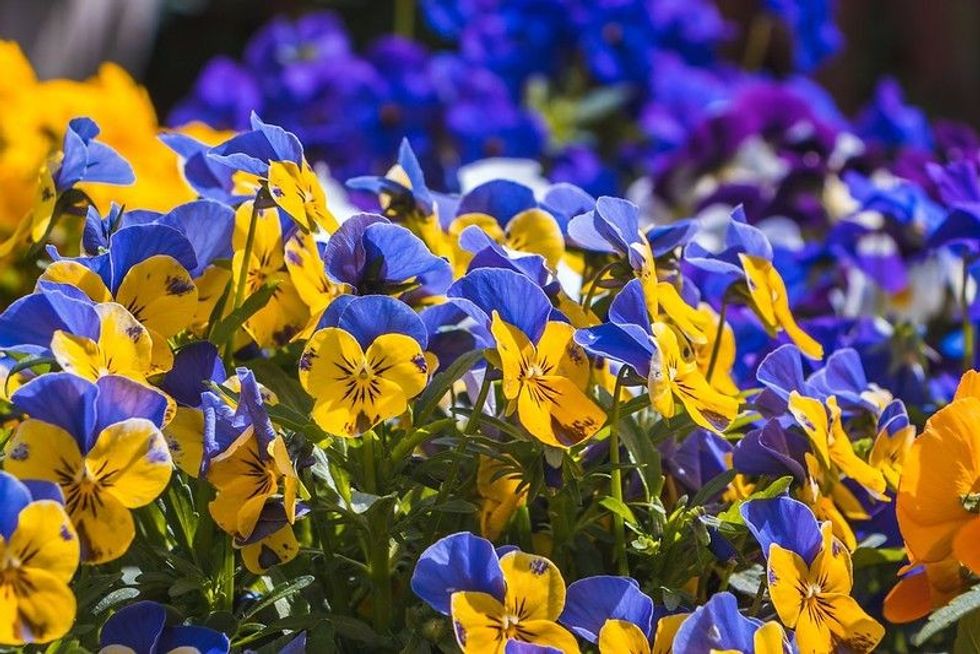
The small blue flowers like Hyacinths or any true blue colored flower to grow in your garden then we can surely help you. We have compiled this of unique blue and white blossoms, which will make a wonderful addition to your place and make your place look even more beautiful.
21. Birdbill Dayflower: As it tends to be accepted by the name, these blue flowers are easy to grow for a day however are a pretty addition to any garden. The blue flowers have three blue petals grown on single stem. It signifies love and respect.
22. Blue False Indigo: As can be expected by the name, the blue false indigo has been utilized for making blue color dye. It has a solid blue tone and stems canvassed in green leaves and little blue flowers.
23. Blue Mist Shrub: or as known Bluebeard is often called blue mist shrub or Caryopteris.
Because of the appearance of this flower, it looks like a mist of blue color in the garden, which is a magnificent and beautiful sight to behold. Thus flower blossoms well in the heat, which makes it a perfect summer plantation, especially for well drained gardens with full sun. It signifies wings or a new journey.
24. Blue Orchid: If you are looking for one of the most popular blue flowers, then you should try Blue Orchid or as known as lovers' flower.
This blossom is known for its excellence, delicate and partial shade, and imperial presence. They arrive in a wide assortment of shapes and shadings yet the blue orchid is viewed as one of the uncommon garden jewels. It signifies spirituality and contemplation and is often associated with the mother's love.
25. Columbine: This flower comes in many partial shade of blue and other colors like pink, red, yellow, violet, and white. It is favored by plant specialists for its sensitive blooms and colored sepals which add a fairy design to the garden. It is associated with sweetheart or lovers.
26. Flax: This blossom is lovely and gorgeous yet it is easy to grow just for a day or two, so on the off chance that you need to add a brilliant blue spot in your garden, ensure you plant a significant number of it to make the most of its excellence for more.
It is associated with royalty and power.
27. Harvestbells: Otherwise called Gentiana Saponaria. This flower is a low-hyanging blossom, which makes it ideal for your nursery if you want to create a canaopy of blue flowers. It offers an exceptional palette of blue colors and shading, thus creating a wonderful landscape.
28. Himalayan Blue Poppy: If you are looking for a unique color and type of poppy flower, then the Himalayan blue poppy is the flower for you.
If you are bored with the regular poppy shades, then try out this partial shade of blue and white poppy which grows in a region that is moderately warm as it needs a hot climate, full sun, and well drained soil to grow.
This bloom is generally found in Tibet and a few districts of the USA. It symbolizes some very deep emotions.
29. Lobelia: This stunning blue flower is moderately easy to grow. It appreciates a cooler climate with no immediate daylight and can also be utilized for hanging basket decoration for your idea of heaven garden plan.
30. Love-In-A-Mist: or as known as Nigella Damascena, is one of the unique blue flowers that can grow in the type of soil, all they need is some versatility in well drained soil, some care, and voila they are ready for you to adorn your garden with. Love-in-a-Mist flower symbolizes love and affection.
31. Lungwort: If you are looking for a unique but home-garden conditions flower, then Lungwort is just the flower that you need to plant in your home or office. This flower requires little shadow and well drained soil to grow.
32. Lupine: Lupines are tall blossoms which makes them a pretty addition to any flower vase embellishment. These blossom requires well-drained soil and full sun to bloom.
33. Morning Glory: This blue flower is also called as blue dawn flower or koali away, this bloom is growing during the day indicating its pretty saucer-shaped blooms that come in various tones like blue, yellow, purple, and red, and shuts its blossoms during the night.
34. Mountain Larkspur: If you are not afraid to take the risk, then this is next plant is extremely toxic but could be a wonderful addition to your gardens.
But mind it you need to careful to keep your children or pets away from it. Regardless of that, this bloom is exceptionally between March to June and can be found in California.
35. Oxford Blue: This blossom is additionally characterized among the distinctive and eccentric garden delights. It has bunches of meager leaves with sharp white veins and cone-formed blossoms with barbed bracts. It pulls in various feathered creatures, butterflies, and honey bees and is partially toxic, so best not to plant it in gardens visited by youngsters and pets.
36. Poor Man’s Weatherglass: Also known as Shepherd's weatherglass bloom this weedy plant grows in temperate regions in Europe and Western and Northern Africa.
37. Siberian Squill: The name of the flowers are named after Siberia – on the off chance that it is offered a cool winter to rest, it will make the most of your eye with an ocean of blue shading blooms in late-winter. It signifies loyalty, fidelity, and constancy.
38. Sweet Pea: This pretty blue flower is generally well known for its scent which is regularly utilized in fragrance production.
39. Veronica: This magnificent bloom grows about 3 feet. These blooms are favored by plant specialists for the most part because of its protection from changing conditions and its generally long blossoming period covering three seasons, including spring, summer, and harvest time.
40. Veronica Georgia Blue: If you are wondering is there a bloom that can used to cover ground, then this is the plant for you. This flower is often used to ground cover in the spring season. This early spring bulbs sprouts in well drained soil and full sun.
Wild Blue Flowers
There are various numbers of blue flowers. Some of their names include Iris, Hydrangea, and Cornflower.
41. Bluehead Gilia: Or as known as Globe Gilia and Queen Anne's Thimble. The blossoms are this shaggy, multi-spreading yearly is local toward the western US, and possibly planted in all US zones. Its light blue pom-pom blossoms will make a beautiful landscape for gardens. It is associated with love and power.
42. Bottle Gentian: Local toward the northeastern US, the container gentian is a herbaceous enduring with a novel bud-like bloom that doesn't open as most blossoms do. It symbolizes royalty.
43. Colorado Blue Columbine: Colorado blue columbine local to the Colorado Rocky Mountain area. It is a wildflower that flourishes in soggy, all around depleted soil. This tough herbaceous enduring does best in the full sun or half shade of cooler atmospheres. It is the state flower of Colorado.
44. Common Hepatica: The normal hepatica is known by different names, including liverleaf, blue anemone, and mayflower. Common Hepatica is local wildflower that is usually found in the southeastern U.S. It's an enchanting wildflower that develops near the ground in woodsy settings, where there are halfway shade and rich, all well-drained soil.
45. Mealy Cup Sage: This dry season wildflower is a solid herbaceous perpetual local to the dirt of the south-focal US, including Texas and Oklahoma. However, this wildflower can also grow in exceptionally colder atmospheres and all year round.
46. Narrowleaf Blue Eyed Grass: This plant is certifiably not a genuine grass, however an individual from the iris family, local toward the eastern US.
refer it to as Lucerne and even Bermuda blue-eyed grass, it makes a general knoll of blue, with clusters of slim green leaves, each brandishing one blossom for every stem. It's a herbaceous perpetual that is amazing as an outskirt plant, and solid in its fitting zones.
47. Northern Blue Flag Iris: The northern blue banner iris is local toward the eastern US. This herbaceous perpetual flourishes in swamps and lake fringes. It's a wildflower that develops in bunches with two-foot stems bested by conspicuous blooms.
48. Texas Bluebonnet: The official state bloom of Texas, the Texas bluebonnet is a local wildflower that wonders in dry soil and full sun.
49. Virginia Dayflower: This three-petaled wildflower has bunches of roses toward the finish of each stem that opens in the first part of the day and closes around early afternoon, enduring one day as it were.
It is a tough herbaceous lasting generally found in the clammy ground in the eastern US. It has a long-developing season going from pre-summer to pre-fall.
50. Wasatch Gentian: This flower is local in Utah's Wasatch Mountains is a solid herbaceous lasting that flourishes in sandy soil with little water. It is often called the Wasatch Beardtongue.
Kidadl has lots of great baby name articles to inspire you. If you liked our suggestions for blue flower names then why not take a look at flower names for girls or, for something slightly different, flower names for dogs.
We Want Your Photos!
More for You
Bachelor of Arts specializing in French with Film Studies, Bachelor of Arts (Year Abroad) specializing in Literature, History, Language, Media, and Art

Georgia StoneBachelor of Arts specializing in French with Film Studies, Bachelor of Arts (Year Abroad) specializing in Literature, History, Language, Media, and Art
Georgia is an experienced Content Manager with a degree in French and Film Studies from King's College London and Bachelors degree from Université Paris-Sorbonne. Her passion for exploring the world and experiencing different cultures was sparked during her childhood in Switzerland and her year abroad in Paris. In her spare time, Georgia enjoys using London's excellent travel connections to explore further afield.
Disclaimer
1) Kidadl is independent and to make our service free to you the reader we are supported by advertising. We hope you love our recommendations for products and services! What we suggest is selected independently by the Kidadl team. If you purchase using the Buy Now button we may earn a small commission. This does not influence our choices. Prices are correct and items are available at the time the article was published but we cannot guarantee that on the time of reading. Please note that Kidadl is a participant in the Amazon Services LLC Associates Program, an affiliate advertising program designed to provide a means for sites to earn advertising fees by advertising and linking to Amazon. We also link to other websites, but are not responsible for their content.
2) At Kidadl, we strive to recommend the very best activities and events. We will always aim to give you accurate information at the date of publication - however, information does change, so it’s important you do your own research, double-check and make the decision that is right for your family. We recognise that not all activities and ideas are appropriate for all children and families or in all circumstances. Our recommended activities are based on age but these are a guide. We recommend that these ideas are used as inspiration, that ideas are undertaken with appropriate adult supervision, and that each adult uses their own discretion and knowledge of their children to consider the safety and suitability. Kidadl cannot accept liability for the execution of these ideas, and parental supervision is advised at all times, as safety is paramount. Anyone using the information provided by Kidadl does so at their own risk and we can not accept liability if things go wrong.
3) Because we are an educational resource, we have quotes and facts about a range of historical and modern figures. We do not endorse the actions of or rhetoric of all the people included in these collections, but we think they are important for growing minds to learn about under the guidance of parents or guardians.

